人教课标选修七Unit 1 Living well Listening exercise(共22张PPT)
文档属性
| 名称 | 人教课标选修七Unit 1 Living well Listening exercise(共22张PPT) |  | |
| 格式 | zip | ||
| 文件大小 | 1.7MB | ||
| 资源类型 | 教案 | ||
| 版本资源 | 人教版(新课程标准) | ||
| 科目 | 英语 | ||
| 更新时间 | 2015-03-20 10:37:09 | ||
图片预览


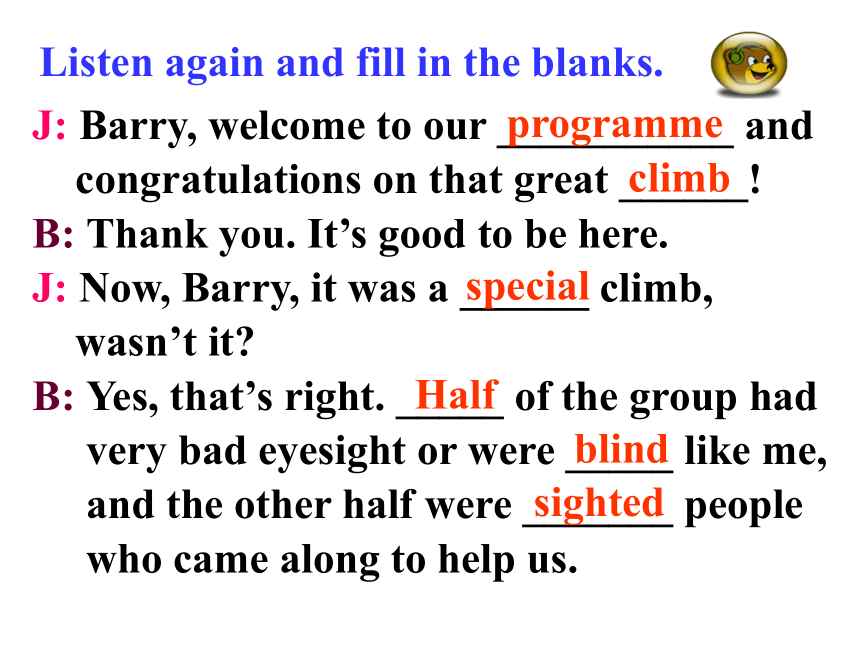
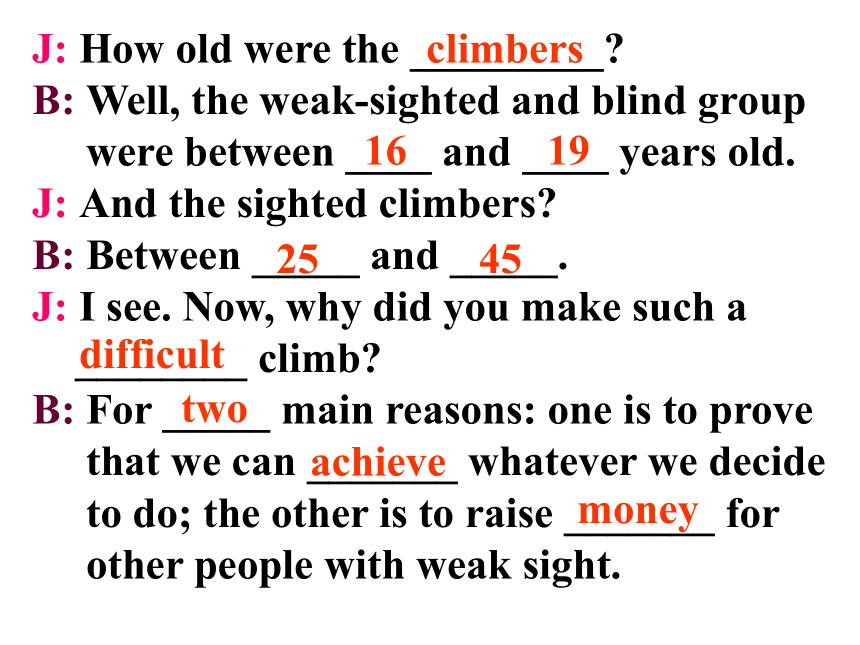
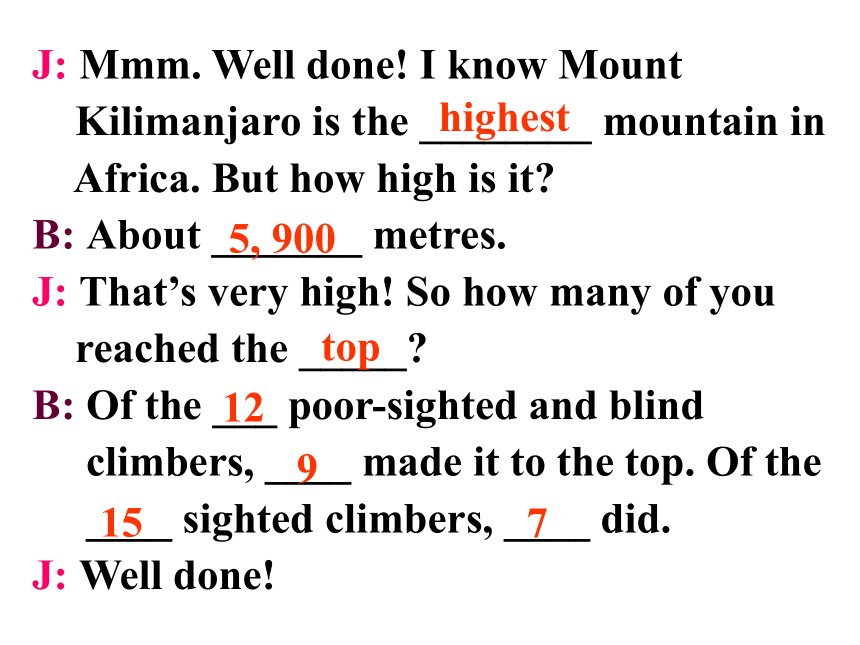
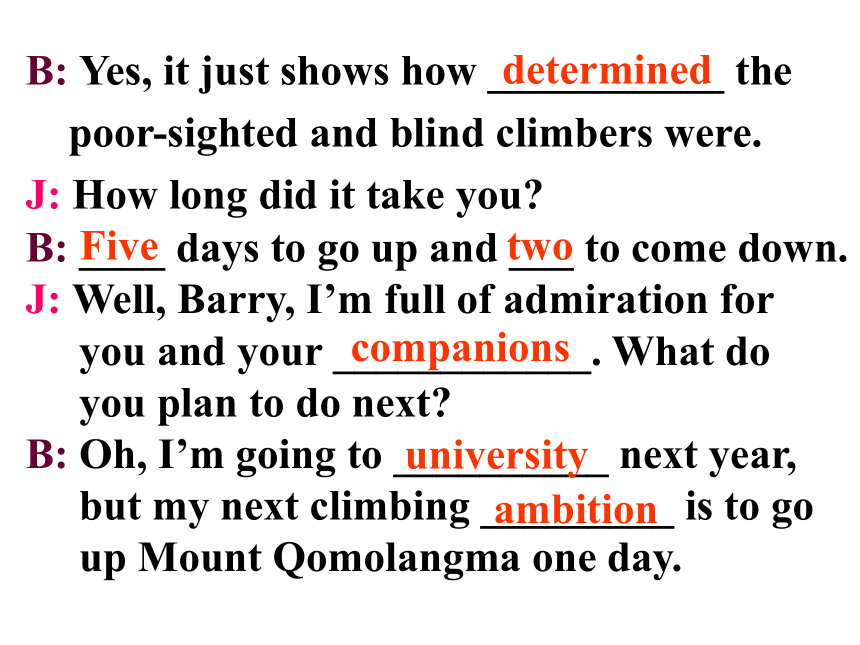
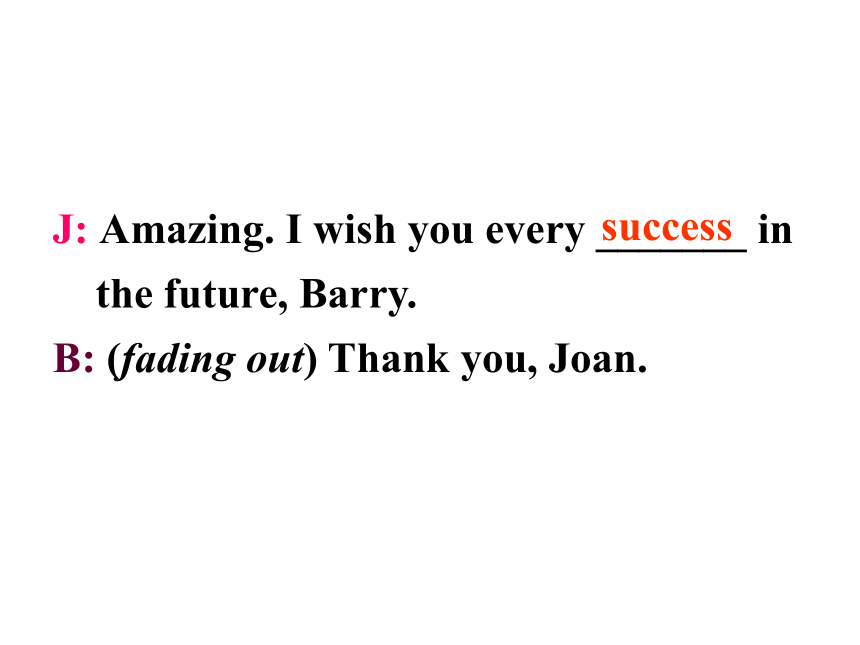
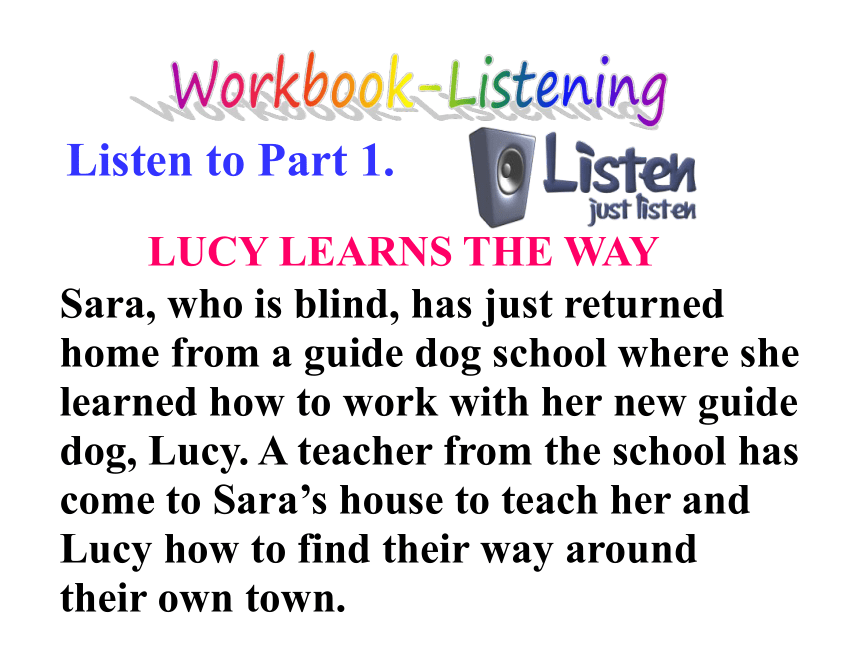
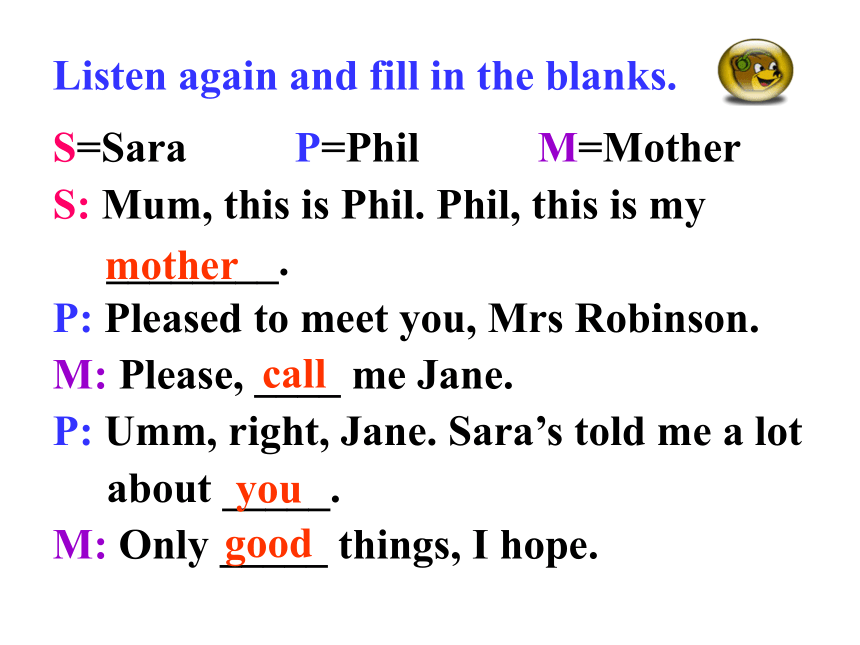
文档简介
课件22张PPT。ListeningUnit 1 Living wellListen to the text.Using LanguageAN AMAZING ACHIEVEMENTBarry Minto (B) has just made a successful
climb of Mount Kilimanjaro, the highest
mountain in Africa. Listen to him being interviewed on the radio by Joan (J).Listen again and fill in the blanks.J: Barry, welcome to our ___________ and
congratulations on that great ______!
B: Thank you. It’s good to be here.
J: Now, Barry, it was a ______ climb,
wasn’t it?
B: Yes, that’s right. _____ of the group had
very bad eyesight or were _____ like me,
and the other half were _______ people
who came along to help us.programmeclimbspecialHalfblindsightedJ: How old were the _________?
B: Well, the weak-sighted and blind group
were between ____ and ____ years old.
J: And the sighted climbers?
B: Between _____ and _____.
J: I see. Now, why did you make such a
________ climb?
B: For _____ main reasons: one is to prove
that we can _______ whatever we decide
to do; the other is to raise _______ for
other people with weak sight.climbers16192545difficulttwoachievemoneyJ: Mmm. Well done! I know Mount
Kilimanjaro is the ________ mountain in
Africa. But how high is it?
B: About _______ metres.
J: That’s very high! So how many of you
reached the _____?
B: Of the ___ poor-sighted and blind
climbers, ____ made it to the top. Of the
____ sighted climbers, ____ did.
J: Well done!highest5, 900121579topB: Yes, it just shows how ___________ the
poor-sighted and blind climbers were.
J: How long did it take you?
B: ____ days to go up and ___ to come down.
J: Well, Barry, I’m full of admiration for
you and your ____________. What do
you plan to do next?
B: Oh, I’m going to __________ next year,
but my next climbing _________ is to go
up Mount Qomolangma one day.determinedFivetwocompanionsuniversityambitionJ: Amazing. I wish you every _______ in
the future, Barry.
B: (fading out) Thank you, Joan.successWorkbook-ListeningListen to Part 1.Sara, who is blind, has just returned
home from a guide dog school where she
learned how to work with her new guide
dog, Lucy. A teacher from the school has
come to Sara’s house to teach her and
Lucy how to find their way around
their own town. LUCY LEARNS THE WAYListen again and fill in the blanks.S=Sara P=Phil M=Mother
S: Mum, this is Phil. Phil, this is my
________.
P: Pleased to meet you, Mrs Robinson.
M: Please, ____ me Jane.
P: Umm, right, Jane. Sara’s told me a lot
about _____.
M: Only _____ things, I hope.mothercallgoodyouP: Definitely. She told me how much you’ve
helped her since her ________.
M: Well, I’ve done my best, But I know Sara
wants to be ______ independent.
P: Well, with Lucy’s help she will be. How’s
Lucy ________ in, by the way?
M: Oh, it’s like she’s always ______ here,
isn’t it, Sara?
S: Yes. She’s been ________ everything in
the house and she knew which was my
_________ right away. accidentmoresettlingbeensmellingbedroomP: That’s good. So, Sara, what shall we
teach Lucy _____?
S: How to take me to ______. Mum’s been
driving me but I want so much to be
able to get there by _____ on my own,
like I used to _______ the accident.
P: Well, let’s get started. First we’ll show
Lucy the _____ to the train station …
(fading out)firstwork trainbeforewayListen to Part 2.An hour and a half later, Sara, Lucy and
Phil return home. (Pause, then sound of
door opening and closing and two sets
of footsteps)Listen again and fill in the blanks.S: (very excitedly) Mum, where are you?
M: In _____, dear.
S: Lucy did it! She found her own way to
the ________ and onto the train.
M: Wonderful! Clever girl, Lucy. How did
she go _________ the street?
P: She was _______. She sat down at the
crossing and waited _____ the cars
stopped … herestationcrossingperfecttillS: Then she stood up and took me _______
across the road. I wish you could have
seen her.
M: Me too, but I’ll get the chance once
you’ve ________ her training. So what’s
next?
P: We’ll give Lucy a bit of _____ and then
we’ll ask her to take Sara to the station
again.
S: Then Phil’s going to _____ Lucy how
to get off the train and take me to my straightfinishedrestshow office. In a few _____, Lucy and I will
be going to work on our own.
M: That’s ________. I’m so pleased for you.
Now, would you like some ______, Phil,
while Lucy is having ___ break?
(fading out)fantasticlunchadaysListen to the text.Workbook-Listening TaskMY HERO: LOUIS BRAILLEGood afternoon, everyone. Today I’d like to tell you about Louis Braille. He made it possible for blind people to _____ and _____.
Louis was born in _______ in 1809. Sadly when he was a little boy, he had an ________. By the time he was _____ years old, he was completely ______. Listen again and fill in the blanks.readwriteFranceaccidentfourblindHowever, at the age of _____ Louis was lucky enough to go to one of the ______ schools for blind children in _____. At this particular school they had ________ books. They were written in ________ French but the letters were raised up off the _____, so that the students could feel the ______ of the words and read them. But there were two problems with this tenfirstParisspecialordinarypageshapesystem, First, the letters were _____ and difficult to _____. Second, the books were very _________ so the school library only had __________ altogether. Louis, who was very clever and ________, thought of a better way to ________ books for blind people to read.hugereadexpensivefourteencreativeimprove In 1821, when Louis was _______ years old, a _______ came to his school. This man had invented a system for soldiers to send and receive messages in the ______. _________ this idea had not worked very well, Louis became very _______ and began experimenting with it. By the time he was ______, he had invented a system which used only six _____. And by 1827 the first book using his system was _________.twelvesoldierdarkexcitedAlthoughfifteendotspublished It still took a long time before people _______ what a wonderful invention Braille’s system was. In fact Louis _____ in 1852 and did not live to see the _______ of his system, which has been adapted to almost every __________ in the world. Thanks to him, blind or weak-sighted people are able to read or write as well as any _______ person.realizeddiedsuccesslanguagesightedThank you!
climb of Mount Kilimanjaro, the highest
mountain in Africa. Listen to him being interviewed on the radio by Joan (J).Listen again and fill in the blanks.J: Barry, welcome to our ___________ and
congratulations on that great ______!
B: Thank you. It’s good to be here.
J: Now, Barry, it was a ______ climb,
wasn’t it?
B: Yes, that’s right. _____ of the group had
very bad eyesight or were _____ like me,
and the other half were _______ people
who came along to help us.programmeclimbspecialHalfblindsightedJ: How old were the _________?
B: Well, the weak-sighted and blind group
were between ____ and ____ years old.
J: And the sighted climbers?
B: Between _____ and _____.
J: I see. Now, why did you make such a
________ climb?
B: For _____ main reasons: one is to prove
that we can _______ whatever we decide
to do; the other is to raise _______ for
other people with weak sight.climbers16192545difficulttwoachievemoneyJ: Mmm. Well done! I know Mount
Kilimanjaro is the ________ mountain in
Africa. But how high is it?
B: About _______ metres.
J: That’s very high! So how many of you
reached the _____?
B: Of the ___ poor-sighted and blind
climbers, ____ made it to the top. Of the
____ sighted climbers, ____ did.
J: Well done!highest5, 900121579topB: Yes, it just shows how ___________ the
poor-sighted and blind climbers were.
J: How long did it take you?
B: ____ days to go up and ___ to come down.
J: Well, Barry, I’m full of admiration for
you and your ____________. What do
you plan to do next?
B: Oh, I’m going to __________ next year,
but my next climbing _________ is to go
up Mount Qomolangma one day.determinedFivetwocompanionsuniversityambitionJ: Amazing. I wish you every _______ in
the future, Barry.
B: (fading out) Thank you, Joan.successWorkbook-ListeningListen to Part 1.Sara, who is blind, has just returned
home from a guide dog school where she
learned how to work with her new guide
dog, Lucy. A teacher from the school has
come to Sara’s house to teach her and
Lucy how to find their way around
their own town. LUCY LEARNS THE WAYListen again and fill in the blanks.S=Sara P=Phil M=Mother
S: Mum, this is Phil. Phil, this is my
________.
P: Pleased to meet you, Mrs Robinson.
M: Please, ____ me Jane.
P: Umm, right, Jane. Sara’s told me a lot
about _____.
M: Only _____ things, I hope.mothercallgoodyouP: Definitely. She told me how much you’ve
helped her since her ________.
M: Well, I’ve done my best, But I know Sara
wants to be ______ independent.
P: Well, with Lucy’s help she will be. How’s
Lucy ________ in, by the way?
M: Oh, it’s like she’s always ______ here,
isn’t it, Sara?
S: Yes. She’s been ________ everything in
the house and she knew which was my
_________ right away. accidentmoresettlingbeensmellingbedroomP: That’s good. So, Sara, what shall we
teach Lucy _____?
S: How to take me to ______. Mum’s been
driving me but I want so much to be
able to get there by _____ on my own,
like I used to _______ the accident.
P: Well, let’s get started. First we’ll show
Lucy the _____ to the train station …
(fading out)firstwork trainbeforewayListen to Part 2.An hour and a half later, Sara, Lucy and
Phil return home. (Pause, then sound of
door opening and closing and two sets
of footsteps)Listen again and fill in the blanks.S: (very excitedly) Mum, where are you?
M: In _____, dear.
S: Lucy did it! She found her own way to
the ________ and onto the train.
M: Wonderful! Clever girl, Lucy. How did
she go _________ the street?
P: She was _______. She sat down at the
crossing and waited _____ the cars
stopped … herestationcrossingperfecttillS: Then she stood up and took me _______
across the road. I wish you could have
seen her.
M: Me too, but I’ll get the chance once
you’ve ________ her training. So what’s
next?
P: We’ll give Lucy a bit of _____ and then
we’ll ask her to take Sara to the station
again.
S: Then Phil’s going to _____ Lucy how
to get off the train and take me to my straightfinishedrestshow office. In a few _____, Lucy and I will
be going to work on our own.
M: That’s ________. I’m so pleased for you.
Now, would you like some ______, Phil,
while Lucy is having ___ break?
(fading out)fantasticlunchadaysListen to the text.Workbook-Listening TaskMY HERO: LOUIS BRAILLEGood afternoon, everyone. Today I’d like to tell you about Louis Braille. He made it possible for blind people to _____ and _____.
Louis was born in _______ in 1809. Sadly when he was a little boy, he had an ________. By the time he was _____ years old, he was completely ______. Listen again and fill in the blanks.readwriteFranceaccidentfourblindHowever, at the age of _____ Louis was lucky enough to go to one of the ______ schools for blind children in _____. At this particular school they had ________ books. They were written in ________ French but the letters were raised up off the _____, so that the students could feel the ______ of the words and read them. But there were two problems with this tenfirstParisspecialordinarypageshapesystem, First, the letters were _____ and difficult to _____. Second, the books were very _________ so the school library only had __________ altogether. Louis, who was very clever and ________, thought of a better way to ________ books for blind people to read.hugereadexpensivefourteencreativeimprove In 1821, when Louis was _______ years old, a _______ came to his school. This man had invented a system for soldiers to send and receive messages in the ______. _________ this idea had not worked very well, Louis became very _______ and began experimenting with it. By the time he was ______, he had invented a system which used only six _____. And by 1827 the first book using his system was _________.twelvesoldierdarkexcitedAlthoughfifteendotspublished It still took a long time before people _______ what a wonderful invention Braille’s system was. In fact Louis _____ in 1852 and did not live to see the _______ of his system, which has been adapted to almost every __________ in the world. Thanks to him, blind or weak-sighted people are able to read or write as well as any _______ person.realizeddiedsuccesslanguagesightedThank you!
